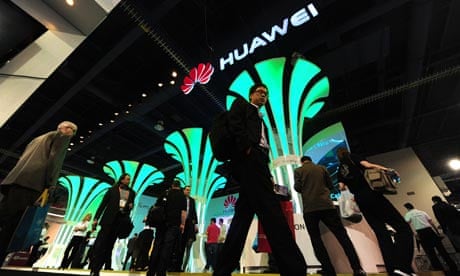Thursday 18 July 2013
Huawei faces cyber security review over Chinese spying fears
Chinese telecoms company has a centre in Oxfordshire, known as the Cell, which will be at the heart of the review

Huawei, which was founded by a former officer in the People’s Liberation Army, first became a major player in the UK in 2005. Photograph: Frederic J. Brown/AFP/Getty Images
A review is to be launched into the role of the Chinese telecoms company Huawei by a senior government security official, in the wake of a parliamentary report that raised concerns about the firm.
Britain's national security adviser, Sir Kim Darroch, will review operations at the company's cyber-security evaluation centre – known as the Cell – in Banbury, Oxfordshire. He will report directly to the prime minister later this year.
The parliamentary intelligence and security committee (ISC) raised concerns last month that Huawei's equipment could be used by Beijing to spy on the UK, and called for an urgent inquiry. The Cell site was set up at the company's expense to ensure the integrity of Huawei's products, which include routers used across the UK's fibre-optic cable network.
A Cabinet Office spokesman said: "The government has carefully considered the ISC's report on foreign investment in the critical national infrastructure and its particular focus on managing new threats to the UK's telecommunications systems and networks. We take threats to our critical national infrastructure very seriously and need to be responsive to changes in a fast-moving and complex, globalised telecommunications marketplace. We have robust procedures in place to ensure confidence in the security of UK telecommunications networks."
Huawei, which was founded by a former officer in the People's Liberation Army, first became a major player in the UK when it signed a deal to supply transmission equipment to BT in 2005. The ISC's report suggested that national security was potentially being put at risk through government fears of jeopardising trade links with powerful countries such as China.
MPs warned of an unacceptable "stalemate" within Whitehall between security considerations and economic competitiveness, and called for the Banbury site to be put under the direct control of the GCHQ intelligence agency. The chancellor, George Osborne, responded by issuing a statement insisting his priority remained boosting trade with China, and pointedly welcomed the opening by Huawei of a new office in Reading.
In a formal response to the report, the government reiterated its commitment to boosting trade links with China, adding it was "important that this balanced approach is taken". It backed the ISC's criticism of the way government dealt with the deal when it was being drawn up, conceding the processes considering national security issues at the time "were insufficiently robust", particularly the failure by officials to inform ministers about the deal for a year.
It added: "The government does not agree with the committee's statement that there have been no improvements since then or that national security issues are overlooked. Indeed, the National Security Council, which was not in existence at the time of the BT/Huawei contract, can and does consider similar issues today in order to ensure [the] government's approach balances economic prosperity and commercial competitiveness with national security."
Huawei said: "Huawei shares the same goal as the UK government and the ISC in raising the standards of cyber security in the UK and ensuring that network technology benefits UK consumers. Huawei is open to new ideas and ways of working to improve cyber security."
No comments:
Post a Comment
Comments always welcome!